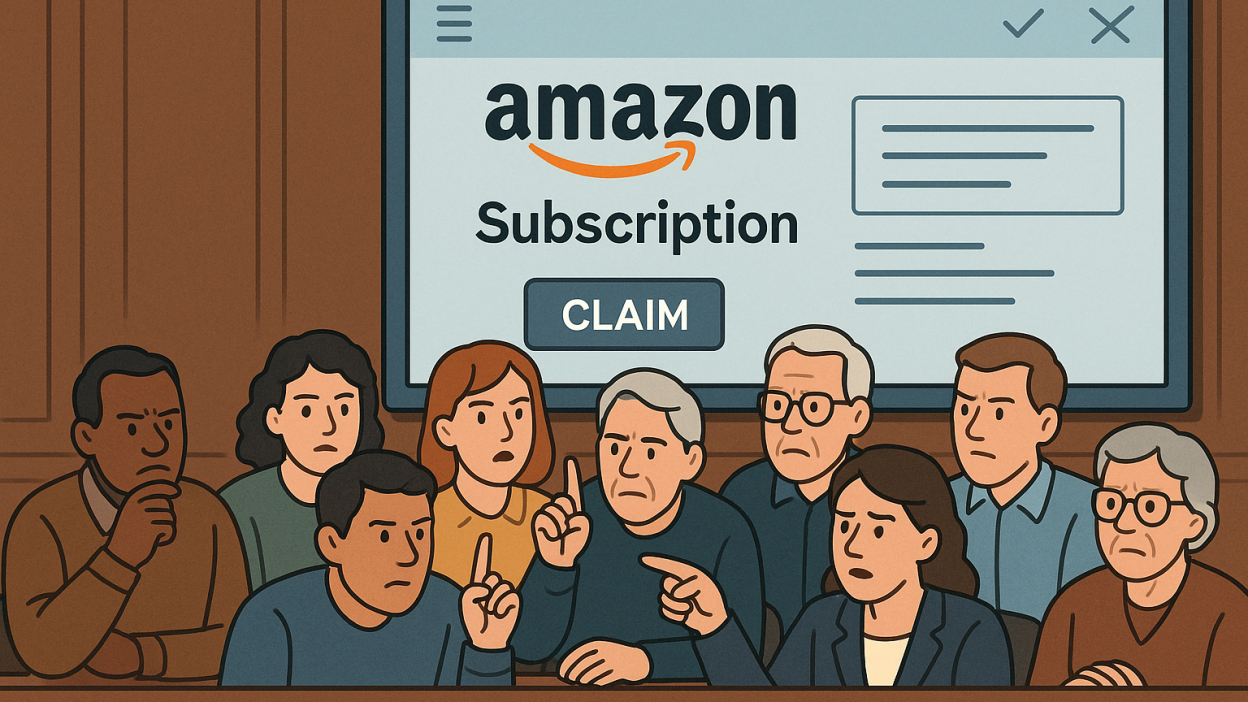Jury to Determine Whether Amazon Misled Consumers into Paying for Prime
Amazon Prime has become a cornerstone of online shopping, offering perks like free shipping, exclusive deals, and streaming services to millions of subscribers worldwide. However, the convenience of Prime is now under scrutiny as allegations arise claiming that Amazon may have misled consumers into paying for subscriptions they did not intend to purchase. This case brings into sharp focus issues of corporate accountability, transparency, and consumer rights in the digital age.
For consumers, the stakes are personal and financial. Many rely on subscription services to manage household budgets and streamline daily routines, trusting companies to provide clear information and ethical practices. Allegations that Amazon may have engaged in deceptive tactics, such as automatic renewals, confusing checkout processes, or unclear cancellation procedures, raise questions about the fine line between marketing and manipulation.
The case also has broader societal implications. It highlights the need for regulatory oversight in an era where digital subscriptions are ubiquitous and consumer behavior is increasingly influenced by automated systems and persuasive design. As a jury prepares to determine the outcome, the trial offers a lens into the intersection of business strategy, legal accountability, and human impact. This article explores the details of the case, the potential implications for consumers and businesses, and the lessons it offers about trust, transparency, and ethical practices in the subscription economy.
A Revolutionary but Controversial Service
Launched in 2005, Amazon Prime quickly transformed the e-commerce landscape. Offering fast shipping, exclusive promotions, and multimedia content, Prime became a household name. By 2025, the service boasts over 200 million subscribers globally, highlighting its immense influence on consumer behavior.
However, rapid growth has also brought scrutiny. Critics argue that subscription services like Prime leverage design techniques that encourage automatic renewals, obscure cancellation options, or promote impulse purchases. In this context, the allegations of misleading practices are not isolated—they are part of a broader debate about consumer protection in a digital economy where algorithms, UX design, and automated processes can shape decisions subtly but profoundly.
From a human perspective, these practices affect trust. Consumers invest not only money but also time and attention, assuming transparency and fairness. When companies exploit the complexity of subscription systems or rely on fine-print disclosures, the consequences extend beyond finances—they erode confidence in digital commerce and affect perceptions of corporate integrity.
Allegations and Legal Context
The lawsuit against Amazon alleges that the company misrepresented the terms of Prime subscriptions, leading consumers to pay unintentionally. Specific claims include:
-
Automatic Renewals: Subscribers may have been enrolled in recurring payments without explicit consent.
-
Confusing Checkout Process: Subtle design elements could have nudged users toward subscription acceptance.
-
Opaque Cancellation Policies: Difficult-to-navigate cancellation procedures may have prevented timely termination of subscriptions.
Legally, the case hinges on whether these practices constitute deceptive marketing or unlawful business conduct under consumer protection laws. Previous cases in the U.S. and Europe have established that companies must clearly disclose subscription terms and provide accessible cancellation mechanisms. A jury will evaluate whether Amazon’s practices cross the threshold from aggressive marketing to consumer deception.
Consumer Behavior and the Subscription Economy
The controversy highlights how subscription models influence human behavior. Studies in behavioral economics show that:
-
Consumers often underestimate the cumulative cost of recurring subscriptions.
-
Default opt-ins and pre-checked boxes significantly increase enrollment rates.
-
Friction in cancellation processes leads to “subscription inertia,” where users continue paying despite no longer wanting the service.
Amazon Prime’s design aligns with these tendencies, intentionally or otherwise. While convenience drives user adoption, the line between ease-of-use and manipulation is delicate. The outcome of this trial could set precedents for how subscription services are marketed, disclosed, and managed in the future.
Case Studies and Comparative Analysis
Other companies have faced similar scrutiny:
-
Netflix: Adjusted cancellation and auto-renewal disclosures after regulatory pressure to ensure clearer terms for users.
-
Spotify: Implemented more prominent alerts about recurring payments and easy opt-out procedures following consumer complaints.
-
Apple App Store: Faced investigations over in-app subscription auto-renewals and consent transparency.
These examples demonstrate a broader trend: regulators and courts increasingly hold companies accountable for clarity, consent, and fair practices. The Amazon case may reinforce the necessity of aligning corporate growth strategies with ethical and legal standards, particularly in services that rely heavily on recurring revenue models.
Economic and Societal Implications
The trial has implications beyond individual consumers:
-
Corporate Practices: A ruling against Amazon could prompt other subscription-based companies to reevaluate design choices, pricing transparency, and consent mechanisms.
-
Consumer Awareness: The case may increase public understanding of subscription pitfalls, encouraging more deliberate decision-making.
-
Regulatory Oversight: Governments may tighten laws governing digital subscriptions, automated payments, and marketing disclosures.
Human impact is central. Consumers may experience direct financial recovery if the case succeeds, but more importantly, the trial underscores the importance of ethical business practices that respect user autonomy and trust. It highlights how legal frameworks protect not only wallets but also confidence in digital commerce ecosystems.
Jury Considerations and Potential Outcomes
The jury will weigh multiple factors:
-
Intent: Did Amazon deliberately mislead users, or were design choices merely aggressive marketing?
-
Disclosure: Were subscription terms sufficiently clear and accessible?
-
Consumer Harm: Did users suffer financial loss or inconvenience due to these practices?
-
Precedent: How will the ruling influence future business and regulatory approaches?
Potential outcomes range from monetary compensation for affected consumers to mandatory policy changes or enhanced disclosure requirements. The verdict could reshape how digital subscriptions are marketed and enforced globally, establishing a benchmark for corporate transparency in online services.
Lessons for Businesses and Consumers
For Businesses:
-
Prioritize transparency in subscription models.
-
Ensure easy opt-in and opt-out mechanisms to maintain consumer trust.
-
Align growth strategies with ethical standards to mitigate reputational risk.
For Consumers:
-
Review subscription terms carefully and monitor recurring payments.
-
Utilize digital tools for tracking and managing subscriptions.
-
Advocate for clear disclosures and support consumer protection measures.
These practices help create a healthier, more transparent digital economy that balances corporate growth with human-centric fairness.
The Amazon Prime case underscores the complex intersection of corporate strategy, consumer behavior, and legal accountability in the subscription economy. As a jury prepares to determine whether Amazon misled consumers, the trial highlights the human dimension of digital services: trust, clarity, and fairness are as crucial as convenience and innovation.
For consumers, the outcome could mean financial relief and a stronger voice in shaping digital commerce practices. For businesses, it is a reminder that aggressive marketing strategies must be balanced with ethical responsibility and clear communication. More broadly, the case exemplifies the societal importance of transparency in the digital economy, influencing how millions interact with subscription-based services daily.
Ultimately, the verdict will not only impact Amazon and its subscribers but also set a precedent for corporate accountability and consumer protection. It reflects the broader principle that in a digital-first world, ethical business practices and informed consumer choices must go hand in hand to maintain trust, integrity, and long-term value in global commerce.
FAQs
Q1. What is the Amazon Prime controversy about?
It concerns allegations that Amazon misled consumers into paying for subscriptions they did not intend to purchase.
Q2. Who decides the outcome of the case?
A jury will evaluate evidence and determine whether Amazon’s practices were deceptive.
Q3. What practices are being challenged?
Automatic renewals, confusing checkout flows, and opaque cancellation procedures are at the core of the allegations.
Q4. How could this affect consumers?
Consumers may receive financial restitution and clearer subscription policies.
Q5. What are potential implications for other companies?
The case could prompt better disclosure practices and ethical marketing across subscription-based services.
Q6. Does this impact global subscription services?
Yes, it may influence regulations and business practices beyond the U.S., especially for companies with international subscribers.
Stay informed on digital subscriptions, consumer rights, and corporate accountability. Subscribe to our newsletter for the latest insights and updates on cases like Amazon Prime and other key developments in digital commerce.
Note: Logos and brand names are the property of their respective owners. This image is for illustrative purposes only and does not imply endorsement by the mentioned companies.



